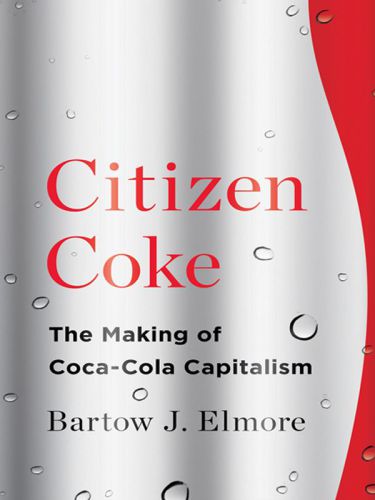
Citizen Coke
The Making of Coca-Cola Capitalism
کتاب های مرتبط
- اطلاعات
- نقد و بررسی
- دیدگاه کاربران
نقد و بررسی

July 28, 2014
Founded in 1866 by a “cash-strapped morphine addict operating out of a small pharmaceutical shop,” Coca-Cola didn’t have the most auspicious beginnings. However, as historian Elmore shows in this detailed profile, the company’s success can be traced to an ingenious strategy: supply only the syrup and let suppliers and franchises bear the costs of bottling and distribution, while utilizing the public water supply. This outsourcing enabled massive growth. Even sugar was outsourced during the 1920s, when a dehydrated, sugarless version of the drink was shipped to overseas bottlers, requiring them to add the sweetener. The potential public relations nightmare of aluminum Coke cans littering the countryside was handily managed by encouraging municipalities to run their own recycling programs, and the role of Coke in the ever-expanding waistlines of Americans was muted by the simple fact that the company is so deeply embedded in local communities. Elmore’s theory is thoroughly and consistently articulated throughout the book, but it’s a narrow one. The company’s marketing and branding efforts get nary a mention, and Elmore struggles with incorporating cultural and dietary trends. Still, this is a well researched and accessible history of one of the world’s most iconic brands. 8 pages of illus.

Starred review from October 1, 2014
An eye-opening account of the "unmatched ecological appetite" behind Coca-Cola's worldwide success. In this deeply informed debut, Elmore (History/Univ. of Alabama) details the outsourcing strategy that he calls "Coca-Cola Capitalism," which has allowed Coke to become the world's top brand, with operations in more than 200 countries, at a huge cost to the environment and human health. Acknowledging the company's marketing genius, Elmore claims that Coke's real secret formula has been to rely on other people's time and money, often using public infrastructure to extract raw materials and transport finished products. The strategy-first developed by mass marketers at the turn of the 20th century and later imitated by McDonald's, large software firms and other corporations-eliminates upfront costs and risky investments. Since its founding in 1886, Coke has relied on partnerships for the sugar, caffeine, water, cans and bottles, and other raw materials needed to create its beverages (now selling more than 1.8 billion servings per day). Drawing on archival sources, the author devotes chapters to the ecological impact of each key Coke ingredient. At little cost, the company uses 79 billion gallons of public water supplies yearly to dilute Coke syrup and an estimated 8 trillion gallons to produce bottles and agricultural commodities. The company also has bottling operations in many arid world regions. Elmore describes how Coke has weathered supply disruptions and controversies regarding caffeine and sugar obtained from others and how its huge success during World War II paved the way for overseas expansion. In recent years, the company's sugary beverages have been a major factor in the worldwide obesity epidemic. Without a doubt, Coke has been a good public citizen that stimulates economies and improves lives, writes the author, but the costs to taxpayers-for recycling systems, public pipes and subsidized farms-and the environment call into question how such unsustainable practices can continue in an age of scarcity. A superb, quietly devastating environmental and business history.
COPYRIGHT(2014) Kirkus Reviews, ALL RIGHTS RESERVED.

November 15, 2014
As a huge multinational corporation that owns or licenses over 500 brands and does business in more than 200 countries, the Coca-Cola Company has been the subject of hundreds of publications covering its advertising prowess and political machinations. Environmental writer Elmore (history, Univ. of Alabama) finds a new angle by examining Coca-Cola's growth via its strategy of exploiting local supply chains and production facilities, effectively outsourcing operations (and environmental impacts) before this tactic became widespread. The author devotes a chapter to each main Coke ingredient of sugar, water, and caffeine, following these throughout history so that in early chapters cane sugar, tap water, and waste tea leaves are main topics while later chapters discuss high-fructose corn syrup, overseas water sources, and coffee beans. A chapter on the beverage container demonstrates that even recycling has been outsourced; bottling plants once received old bottles but now the burden of ethical disposal falls to the consumer. Elmore's thorough research covers internal squabbles, local protests, health concerns, and above all, the tension between Coca-Cola's expansive outlook and the environment's limits. VERDICT An important addition to literature on Coca-Cola and capitalism in general. For all libraries.--Heidi Senior, Univ. of Portland Lib., OR
Copyright 2014 Library Journal, LLC Used with permission.

Starred review from November 1, 2014
Coca-Cola capitalism as a corporate strategykeeping the secret formula but outsourcing all the risks to suppliers and franchisershas been so successful that other soft-drink makers, fast-food companies, and software firms have followed it. Elmore looks at the origins and success of Coca-Cola in its climb from maker of a sweet elixir that claimed to heal all manner of maladies to global enterprise using 79 billion gallons of water each year. Coke started out supplying its syrup to be diluted with water at local soda fountains and moved on to franchising bottling plants, at each step taking the markup and leaving the risk. In separate chapters, Elmore focuses on an ingredient in Coke, from water, sugar, and coca leaves to aluminum and plastic, detailing how the corporation secures its commodities and cuts deals with local governments and companies. From the Gilded Age to the global age, Coke has reduced its own risk while leaving in its wake risks of all sorts, from the ecological threat of discarded cans and plastic bottles to enormous demand for scarce water to health risks associated with drinking such sugary beverages. A riveting look at an iconic American company and the long-range implications of its practices.(Reprinted with permission of Booklist, copyright 2014, American Library Association.)

























دیدگاه کاربران